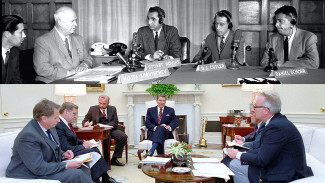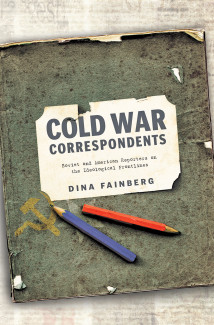
Johns Hopkins UniversityEst. 1876
America’s First Research University
Cold War Correspondents: Soviet and American Reporters on the Ideological Frontlines

Between 1945 and 1991, dozens of American and Soviet journalists moved to the capital cities of Communism and Capitalism to report on the rival superpower. They wanted to understand a country that appeared to stand against everything that they held dear and explain that country to their readers. They spent years living abroad, travelled around, made friends, read the local newspapers, went to the movies, shopped, took their kids to the playground, and wrote about these experiences for audiences back home. In an era of closed borders, the reports of foreign correspondents were the nearest readers could come to actual visits to Moscow or New York City. Ordinary people, pundits, and policymakers on both sides came to see the Soviet Union or the United States through the eyes of these journalists.
My first encounter with these protagonists was through the books that American and Soviet journalists wrote at the end of their assignments. These were detailed accounts, where journalists provided rich descriptions of the Soviet Union or the United States and talked about their personal and professional experiences. The books were peppered with captivating stories and thoughtful analyses of life on the other side. What surprised me, however, was how much the books revealed about the journalists’ view of their own societies. It struck me that an invitation to read comparatively, to draw parallels between the Soviet Union and the United States, to reflect on one, as you were reading about the other, was embedded in these texts both implicitly and explicitly. It interested me that in two such different political systems and media cultures, the same group of people – professional journalists – was responsible for representing the outside world to domestic audiences, and that as they did so, both sets of journalists reflected on the Cold War rival and on their own countries.

Yet, since the end of the Cold War, the work of American and Soviet foreign correspondents had been assessed differently. American reporting from the Soviet Union was remembered as an accurate, objective portrayal of reality. Soviet reporting from the United States was depicted as propaganda that purposefully misrepresented reality and cast it in a negative light.
My reading of the journalists’ books showed that things were not so clear-cut. For example, American correspondents’ reports on the Soviet Union often aligned with the ideas that dominated US government propaganda at home and abroad. The reports of Soviet correspondents from the US often pushed the boundaries of official statements and featured complicated and nuanced portrayals of American life. Journalists on both sides frequently drew on the experiences of those who became disillusioned with the promises of the socialist utopia or the American Dream, effectively channeling the criticism that people on both sides raised against their own socio-political systems.
Associating one set of journalists with truth and the other one with lies did not do justice to these rich sources. Soviet and American correspondents alike claimed to be speaking the truth, and I decided that these claims should be taken seriously and interrogated. Among the central questions in my book, Cold War Correspondents, is what “truth” meant for American and Soviet correspondents and how their claims to speak the truth produced diametrically opposed narratives about what the Soviet Union and the United States were really like.
Order Cold War Correspondents: Soviet and American Reporters on the Ideological Frontlines at the following link: https://jhupbooks.press.jhu.edu/title/cold-war-correspondents
Dina Fainberg is an assistant professor of modern history at City University of London. She is the author of Cold War Correspondents: Soviet and American Reporters on the Ideological Frontlines and the coeditor of Reconsidering Stagnation: Ideology and Exchange in the Brezhnev Era.



